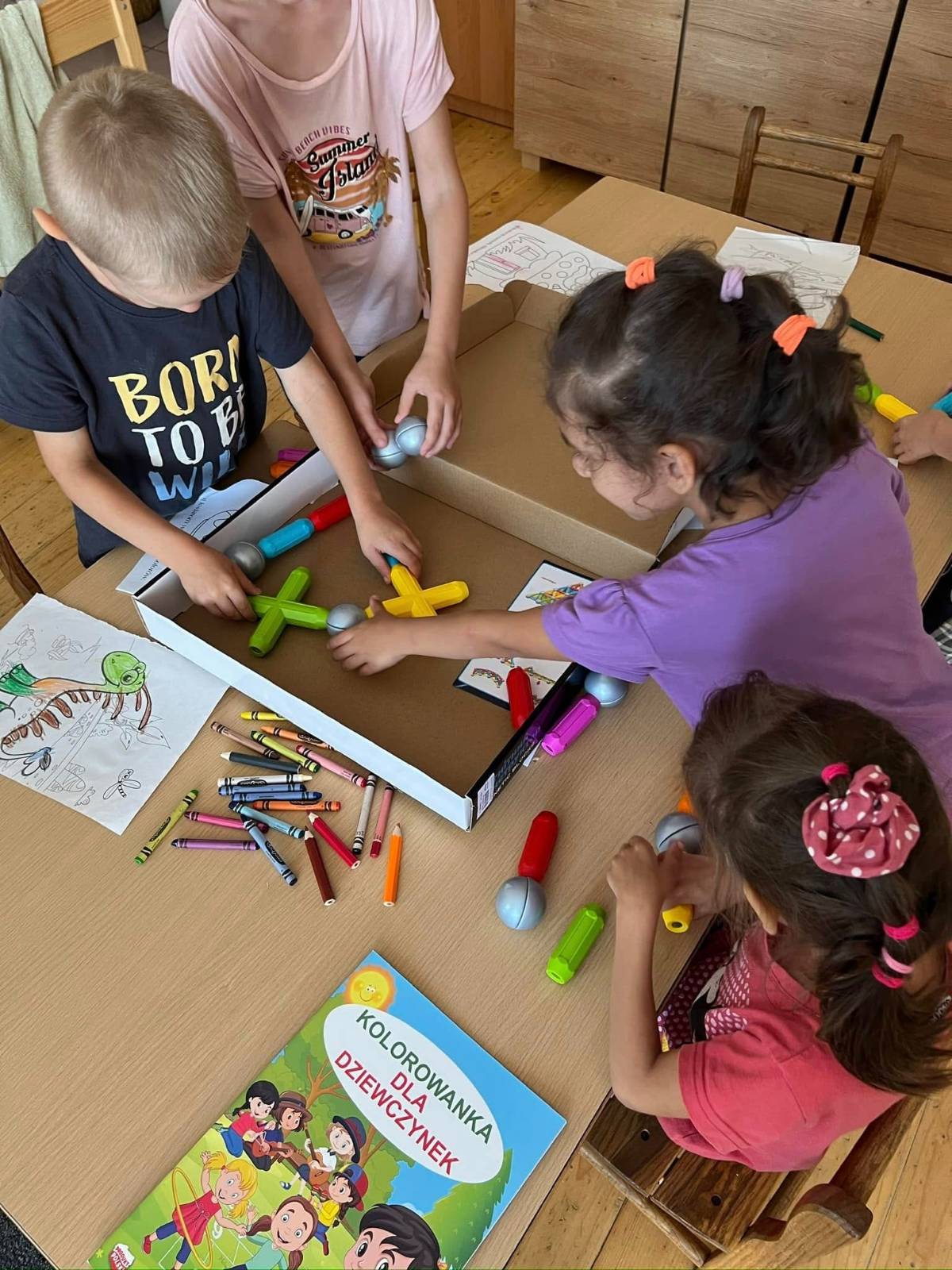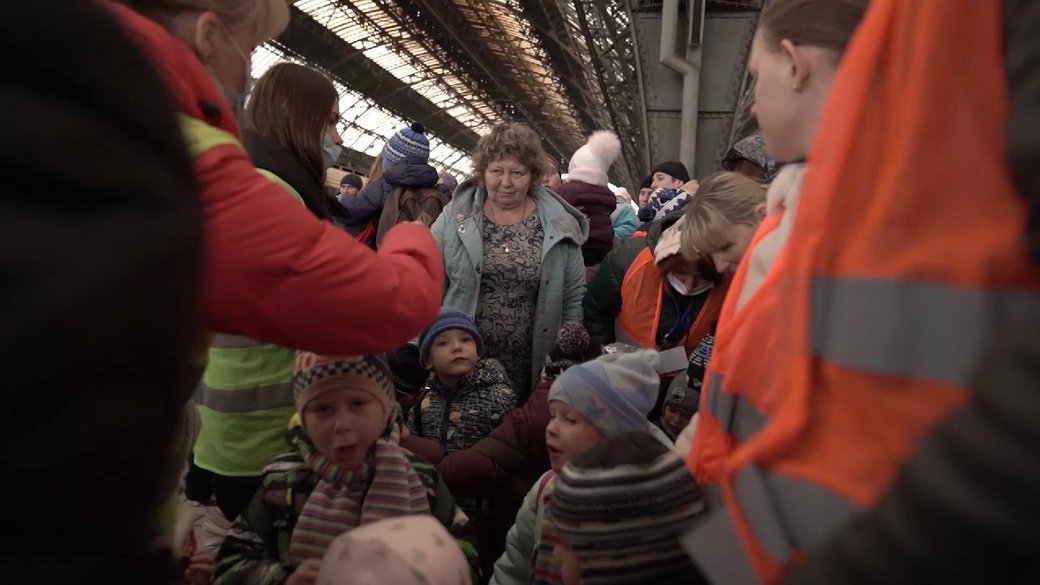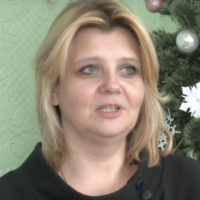The largest Ukrainian orphanage, “Sonechko”, evacuated all the children from Zaporizhzhia to the Lviv region during the first weeks of the Russian invasion. However, most employees who should have evacuated together with the kids, stayed in Zaporizhzhia, and continued to receive their salaries and bonuses for over three more years.
Maintaining the orphanage without children cost a total of over UAH 230 mln, almost UAH 212 mln of which went to pay the employees, most of whom were officially in a “standby” mode.
This investigation has become possible thanks to the participants of the NGL.media community, who have access to special content and possibilities.
NGL.media journalists took notice of the Zaporizhzhia orphanage “Sonechko” this spring, when we worked on the text about Ukrainian orphanages getting millions of hryvnias using manipulations involving children. Our attention was drawn to the fact that “Sonechko” had the largest budget among all the children’s institutions in Ukraine.
Several places, from which we tried to find out what was happening there, told us, “Are you talking about “Sonechko”? Write about it.” So we did.
This story is not about poor abandoned children, it is about greedy officials and specialists of the social sphere who were able to leave the kids, but weren’t able to refuse their salaries.
Evacuation
The first explosions sounded in Zaporizhzhia in the morning of February 24, 2022. First, Russians hit the airport near the city, then the strikes were reported by the residents of the suburbs. Evacuation trains started leaving the city, but the “Sonechko” orphanage, which housed children aged several months to six years, wasn’t in a hurry to evacuate its wards. The institution didn’t have an equipped bomb shelter, but at first, the institution’s management hoped that they would weather the storm.
Olha Revchenko, the pediatrician of “Sonechko” orphanage, recalls that all her colleagues believed the war would soon end. Only in the middle of March, they started leaving together with the children to Lviv by evacuation trains.
That’s how the doctor and 13 kids turned out to be in the Lviv orphanage, “Malvy”. “We were gathered in the same room where you and I are now,” Olha Revchenko said, looking around a large room of the current Children’s Health and Rehabilitation Centre in 2024, the Lviv Regional Council reorganized “Malvy” and one more orphanage into the Centre for Rehabilitation and Palliative Care for Children. “At that time, I had one bag and a backpack with me. I planned to go back to Zaporizhzhia in a few weeks. Almost four years have passed, and I am still here.”
Olha Revchenko turned out to be the only employee out of 424 “Sonechko” specialists who has moved and still stays with the children. Several colleagues came to Lviv to take care of the kids on a rotational basis. Most employees went into the so-called “standby” mode Suspension of work, caused by the absence of organizational or technical conditions, required for implementation of work, by force majeure or other circumstances (Article 34 of the Code of Labour Laws of Ukraine). The standby mode may last as long as there are circumstances or reasons for its introduction, having refused to leave together with the children. In this case, at least 2/3 of the specialist’s wage rate is paid, and this period is added to the work experience.
Where did the children go
In March 2022, a total of 178 children under six years of age were taken out of “Sonechko”. Although they were officially registered with this orphanage, they actually lived a thousand kilometers away from that place, mostly in the Lviv region.
“The fact that children were still registered with the institution in Zaporizhzhia delayed their transition to the family-based foster care. Pursuant to the law, potential adoptive parents or people, willing to take children in their care, had to address the Service in children’s issues of the city, where a child was officially registered. In this case, it was Zaporizhzhia,” Vasylyna Dybailo, the director of the international charitable organization, “Partnership for Every Child”, explained; she helped potential adoptive parents and even paid for “Sonechko” employees’ staying in Lviv hotels several times.
A total of 263 children were relocated from Zaporizhzhia to the Lviv region between 2022 and 2024. Out of these, 146 children were placed into family-based foster care.
Children left, but employees didn’t
As stated above, at the moment of the Russian invasion into Ukraine, 424 employees worked at “Sonechko” and took care of under two hundred children, which is conditioned by the fact that these kids need care for 24 hours. After evacuation, these children required care too, but “Sonechko” employees came to them in a very irregular manner and the main responsibility for the wards devolved upon the institutions, to which they were relocated.
Lilia Filipska, the head of “Sonechko” since 2019, is not eager to comment on the passivity of her employees, who practically abandoned their wards. “Maybe, there is sense in talking to the specialists who didn’t leave, and not to me?” she asked in a phone conversation with NGL.media. “Some people decided to be on standby; they didn’t want to go 24/7 like we did. Would you force your specialists to leave their families, father or mother who needs help?”
Filipska, being the official guardian of the “Sonechko” children, came to the Lviv region on many occasions. Now, she lives in Zaporizhzhia permanently.
The director of “Sonechko” insists that her employees “provided [evacuated children] with assistance as needed, and children were always well cared for”.
Some “Sonechko” employees actually came to the Lviv region on a rotational basis, at least initially, but the numbers listed in the documents differ considerably. For instance, according to the data of the orphanage in Zhuravne [вставка: the Zhuravnensky House of Psychoneurological Supported Living], where most children from Zaporizhzhia were transferred, in the first year of the full-scale war, 113 “Sonechko” employees came there, in the second year – 66, in the third one – 11, and this year, there has been none. On the contrary, the officials of the Zaporizhzhia regional military administration are sure that in 2022, 134 “Sonechko” employees worked in Zhuravno, in the two following years – 117 and 112, respectively, and this year, there have seemingly been 67 employees.
“During the first year, there were on average 35-45 “Sonechko” employees every month. The specialists used to go home; they had an order to stay for one month [of a business trip], for example, and one to two months later, they would come back,” Olha Buianova, the director of the Zhuravnensky House of Psychoneurological Supported Living, explains.
According to the data, which are at the disposal of NGL.media, since the moment of children’s evacuation, almost 300 “Sonechko” employees were on standby in 2022-2025. In the words of Oksana Naidionova, the former deputy director of the Zaporizhzhia orphanage, these people didn’t work, but were paid two-thirds of their wages.
“What, should we have fired them? For people to be left in the street without any salary at all? We were going to work further on,” Oksana Naidionova explained such a number of employees on standby.
NGL.media heard similar excuses from Viktoria Klymenko, the head of the Department of Health Care of the Zaporizhzhia RMA. In her words, since the beginning of the full-scale war, “Sonechko” employees wouldn’t be able to find a job in Zaporizhzhia, so they were not fired.
“You don’t understand what was happening in 2022-2023 here. We wanted to keep our employees, otherwise, how would we find people if children were to return to Zaporizhzhia?” Klymenko believes.
She says that it was impossible to reduce the number of employees on standby on legal grounds as well, “If the institution is functioning, and there is a legal entity, what are the prerequisites for activity suspension? There is none.”
Salaries and bonuses constitute almost the entire budget
From 2022 to 2025, the budget of “Sonechko” orphanage was UAH 297 mln, UAH 233 mln of which was spent. The share of salaries and bonuses for the personnel in this amount was almost UAH 212 mln.
In the opinion of Kyrylo Nevdokha, who has personal experience of orphanage life, large budgets of orphanages may be “mastered” using a scheme in which people give their employment record books (to accumulate work experience) but actually don’t work there.
“During monitoring visits, my colleagues found cases, in the Ternopil region, for instance, when officially there were more listed full-time employees than actually working ones. And there was no information about sick leave or a vacation. I suspect that a scheme “give us your employment record book and we give you a salary” is quite popular in other institutions as well. Another variant is when a bonus is given to a person, and he gives some of it to the director,” says Kyrylo Nevdokha, the head of the “DIiMO”, the Office for Children and Youth at the Ministry of Social Policy.
Noteworthy is the fact that bonuses were among the expenses of “Sonechko”. According to the documents at NGL.media’s disposal, in September 2024, bonuses totaled UAH 800 thousand. Eleven specialists received additional payments on an unexpected occasion – due to the Christian holiday of the Nativity of the Mother of God. At least, this was a reason stated for the bonuses.
Almost 100 employees got a bonus that month. The largest amount, a total of UAH 31 thousand, was received by the then-deputy director, Oksana Naidionova. She also assigned bonuses to most employees.
In her comment to NGL.media, Naidionova stated that bonuses were given to employees who were not on standby – teachers, doctors, and the administration of the institution. She refused to provide more details on the principle of their accrual, explaining that she doesn’t remember them. Since the beginning of this year, Oksana Naidionova has been working in a new position.
NGL.media journalists managed to contact several former employees of “Sonechko” who received bonuses in September 2024, according to the documents. Most of them don’t remember clearly when and why they received additional payments.
Till spring 2025, Olha Chervonenko worked at “Sonechko” as a teacher and took business trips to Zhuravno in the Lviv region. According to the documents, in September 2024, she received UAH 8 thousand bonus. The lady claims that they received additional payments for business trips, indeed, but “up to UAH 5 thousand maximum.”
At the same time, her former colleague, Liudmyla Streshna, a nurse, who also accompanied children to the Lviv region and allegedly was paid additional amounts, told NGL.media that she had not received any bonuses.
The same was claimed by Yulia Bratsylo, who used to work as a cook in Zaporizhzhia and allegedly received additional UAH 16 thousand that month. In her words, she doesn’t remember getting a bonus for this amount.
Who paid for the children’s living arrangements?
“Sonechko” didn’t spend its money to keep the evacuated children. Every year, UAH 5-10 mln were spent on public utilities, food, and other expenses in Zaporizhzhia, because the orphanage partially continued to function. In several weeks, newly brought children were sent to safer regions of Ukraine.
As for the relocated wards of “Sonechko”, they were accommodated at the expense of the institutions they were evacuated to. In response to the NGL.media’s inquiry, the Lviv regional council provided the information about the expenses from the regional budget for living arrangements of children from “Sonechko” in each municipal institution in the Lviv region. In 2022-2025, a total amount was almost UAH 123 mln which is almost twice less than what “Sonechko” spent only on the salaries of its employees.
In addition to the budget, charitable assistance was collected for the kids. For example, “Shchaslyve sonechko” [Happy Sun] charitable foundation declares that, among others, it helps the children, evacuated from Zaporizhzhia.
“We have been cooperating with this orphanage for over ten years. I am a volunteer from Zaporizhzhia, so I decided to help these children. When they were evacuated, I continued collecting the money and going to them,” Yulia Shved, the head of this foundation, told in her comment for NGL.media.

Evacuated children play in the Zhuravne supported residential home for psychoneurological types in the Lviv region, August 2024 (photo by Yulia Shved)
When asked why there are needs for food, diapers, and clothes for children, if these items are included in the budget, Yulia Shved answered that it usually happens due to unforeseen circumstances when the bidding is still ongoing, but the items are required urgently.
“You can’t tell a child, ‘Don’t pee because the bidding isn’t over yet’. Or, for instance, there is no money to install a conditioner, or a bed or a wardrobe is broken. This is what sponsors are for. It is like in a large family, something got broken, something got burned – ordinary things,” Yulia Shved believes.
Olha Buianova, the director of the Zhuravnensky House of Psychoneurological Supported Living, confirmed that she regularly received assistance from the “Shchaslyve sonechko” foundation. However, when asked why these needs were not met with the budget of the “Sonechko” orphanage, which was intended to cover basic children’s needs, Buianova was unable to answer. “I am not ready to talk about it, address the Zaporizhzhia RMA, I don’t know why,” she said.
The end of “Sonechko”
At the end of December 2024, the Zaporizhzhia RMA announced that “Sonechko” orphanage would be closed. A part of its functionality was transferred to the Zaporizhzhia regional children’s clinical hospital. Officially, this institution was closed in June 2025.
“During this period, children grew up and could not stay in this orphanage for little children; they had to be transferred to other orphanages. So we gave them away throughout the entire country. When we gave the children away, we attached this institution to the children’s regional clinical hospital, and opened a social support department in it. Again, children from this department will go further,” Viktoria Klymenko, the head of the Department of Health Care of the Zaporizhzhia RMA, explained.
As per Vitalii Dudin, a lawyer in the field of labour legislation, Ukrainian laws don’t limit the standby period. “However, a wider circle of interests should be considered. Keeping a standby mode for a long time means spending massive budget finances,” he believes.
Could “Sonechko” employees on standby have been suggested other employment variants? Vitalii Dudin says that Ukrainian legislation gives such possibilities. “The administration should have considered the possibility of transferring the functionality of the institution or reducing the number of personnel. Also, the Code of Labour Laws allows for temporary transition of employees to other jobs in standby conditions,” the lawyer explains.
The head of the Department of Health Care of the Zaporizhzhia RMA claims that there were no variants of getting “Sonechko” personnel employed in other institutions. The first reason was that nobody wanted to move.
Were there alternatives? If the employees were fired, they could have applied to the unemployment service and received the unemployment benefit. Depending on their work experience, this benefit typically constitutes 50% to 80% of their wages during the first half of the year. For soon-to-retire individuals, the state provides a benefit for up to two years. During this period, the unemployment service could have found alternative employment for former “Sonechko” employees who had been waiting for the institution to return to Zaporizhzhia for three years.
Despite the efforts of the “Sonechko” management to keep the collective body together, former employees, with whom the journalists were able to speak, didn’t receive any job offers in the new department of the children’s hospital or in any other institution within the Zaporizhzhia region. Some of them have retired, and some have found themselves in a new field. The head of the orphanage doesn’t want to recollect this specialized institution herself.
“Let’s negotiate it this way: we are no longer ‘Sonechko’ orphanage, we don’t exist anymore, so don’t call me,” said Lilia Filipska, the ex-head of the orphanage, in her farewell.
Authors Mariana Verbovska and Mariia Horban, editor Oleh Onysko, infographics Nazar Tuziak, translation Nelya Plakhota, illustration Victoria Demchuk



